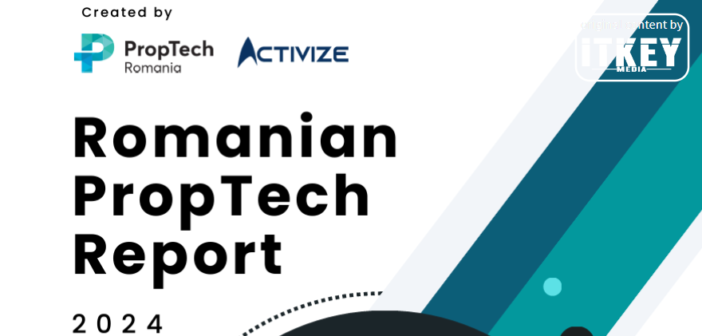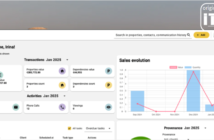- Proptech Romania and Activize released a report on the current state of proptech in Romania and the vertical’s challenges and perspectives
- Industries that work with real estate i are some of the most conservative in the world, and Romania is no exception
- This underscores the need for innovation, and it’s up to local startups to keep up
Proptech Romania and Activize have prepared a comprehensive report on Romanian startups providing digital and tech products for the real estate market. The report captures the current state of innovation in the Romanian real estate market and spotlights the most notable players in this field.
Proptech Romania was conceived in 2019 to connect key players in the real estate market with proptech startups to foster innovation and digital transformation in the industry. By leveraging entrepreneurship, expertise, and a network of mentors and business partners, Proptech Romania drives the creation and implementation of innovative products, new business models, and impactful collaborations that deliver scalable results across Romania, the CEE region, and beyond.
Activize takes on the mission of startup scouting, ecosystem mapping, acceleration programs, and fundraising assistance. The organization monitors and gathers insights on the startup ecosystems of Romania and the CEE region to pack this information for stakeholders in a meaningful and impactful manner.
The Romanian PropTech Report 2024 covers 129 Romanian startups, organized into seven sectors: brokerage and marketing, finance and investments, intelligent construction tools, productivity, property management, and space digitalization with augmented/virtual reality. Key market trends and challenges are also outlined, taking into account economic fluctuations and European regulations impacting the real estate industry, including environmental measures, carbon footprint reduction, building energy efficiency, and ESG implementation.
The Stale Real Estate Industry

Ciprian Pașca, President at PropTech Romania
Proptech Romania’s president Ciprian Pașca reminds the well-known fact that the global real estate industry has incorporated technology at a much slower pace compared to other industries, and the Romanian market is no exception. At the same time, this sector expresses great need for innovation as developers experience pressure in the context of new legislative measures imposing rigorous construction standards for environmental protection and sustainable urban development.
VAUNT’s co-founder and CEO Irina Constantin shares that she has discussed the rigidness of the real estate sector with many people in this space: developers, family offices, tech developers, startups, VCs, and others. On the one hand, traditional industries with huge markets tend to be fragmented, but on the other hand, these industries have massive global footprints and play critical roles in the global economy, influencing various other sectors and contributing significantly to GDP in many countries.
‘To create change, it’s essential to solve real problems and innovate while considering the entire ecosystem. In my opinion, for these markets to be disrupted, we need compound startups to enter the space. These startups can bring integrated solutions that address multiple aspects of the industry simultaneously. It seems to be happening more now than ever, as most people realize that compound startups are necessary for technology to stick and make a lasting impact,’ Ms Constantin states.
While the authors of the report admit that Romania is still in the early stages of real estate technology, the local proptech industry does stand out with a series of innovative solutions, many of which are already present at the international level.

Bogdan Nicoară, Co-Founder and CEO at Bright Spaces
When talking about Romanian proptech startups, the first company that comes to mind is Bright Spaces – the Bucharest-based real estate 3D visualization provider whose story ITKeyMedia has been following closely. Its co-founder and CEO Bogdan Nicoară (who, by the way, was a guest on one of ITKeyMedia’s podcasts) states that the real estate sector has historically been conservative, with established practices that have proven effective for decades, and many industry players see little need to deviate from methods that have worked reliably for over 70 years.
Interestingly, the level of rigidness in adopting technology varies across different real estate verticals. While the residential sector has traditionally been ahead – thanks to the spread of online property listings, virtual tours, and digital transaction platforms that make it easier for buyers and renters to explore options and complete transactions remotely. Meanwhile, the office and industrial verticals are now seeing a significant acceleration in technology adoption.
‘In the office sector, the rise of flexible workspaces and changing tenant expectations have driven the adoption of digital twins, 3D visualizations, and interactive leasing platforms, making these tools increasingly prevalent. Similarly, the industrial sector is embracing digital tools to optimize operations, improve efficiency and showcase spaces to prospective tenants and buyers. Landlords and property managers in these sectors are recognizing the need to leverage technology to attract and retain tenants in an increasingly competitive market,’ Mr Nicoară comments.
The Critical Need for Innovation

Irina Constantin, Co-Founder and CEO at VAUNT
The entrepreneur is convinced of a critical and urgent need for digital transformation in the real estate sector. ‘Those who delay in embracing this shift may find themselves left behind, facing significant losses. Conversely, the innovators who adapt and lead the charge in digital adoption will reap substantial rewards and set new industry standards,’ Mr Nicoară says.
In Ms Constantin’s opinion, these markets need compound startups to enter the space to disrupt them. Such startups can bring integrated solutions that address multiple aspects of the industry simultaneously.
‘It seems to be happening more now than ever, as most people realize that compound startups are necessary for technology to stick and make a lasting impact. To create change, it’s essential to solve real problems and innovate while considering the entire ecosystem,’ Ms Constantin tells ITKeyMedia.
The Importance of the Initiative

Mircea Vâdan, Managing Partner at Activize
In this context, it is apparent how a report like the one prepared by Proptech Romania and Activize helps the proptech vertical’s development.
‘We see the community growing, people getting to know each other better, collaborating, and supporting one another. We hope to see an acceleration program as well, for support, specialized mentoring, and connection with potential clients, corporations, and investors,’ Activize’s managing partner Mircea Vâdan says.
The challenges in the field of Romanian proptech development and popularization are significant. It’s up to startups to help optimize processes, achieve more efficient monetization, and reduce costs for real estate developers, owners, and companies in the industry.

Kostiantyn is a freelance writer from Crimea but based in Lviv. He loves writing about IT and high tech because those topics are always upbeat and he’s an inherent optimist!





